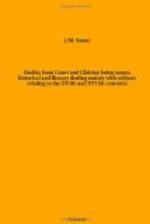Then, says his biographer,* he asked to be shown the axe, and kissing the blade, he said: “This gives me no fear. It is a sharp and fair medicine to cure me of all my disease.”
* Edwards, Life of Sir Walter Raleigh, i. 704.
After Raleigh’s death, the Archbishop of Canterbury, writing to Sir Thomas Roe, ambassador of Great Britain with the Great Mogul, 10th February 1618, said: “Sir Walter Raleigh amongst us did question God’s being and omnipotence, which that just judge made good upon himself in overtumbling his estate, but last of all in bringing him to an execution by law, where he died a religious and Christian death, God testifying his power in this, that he raised up of a stone a child unto Abraham.”
His doom had been from the first a foregone conclusion. James having been fatally prejudiced against him before that royal pedant ever set foot in England, to which fact the secret correspondence of Sir Robert Cecil with James vi. of Scotland amply testifies.
But curiously enough Sir Walter’s brother Carew, although more deeply dyed in atheism, never ceased to be a Persona grata with the government. He was knighted in 1601, on the occasion of the visit to England of the French Marshal de Biron.* He held several honourable and lucrative public offices under James I., and was Lieutenant of the Isle of Portland in 1608. During his brother’s long imprisonment in the Tower, Sir Carew Raleigh was living in prosperity at Dounton.**
* Stebbing, Sir Walter Raleigh, p. 157.
* Ibid, p. 248.
Atheists did not as a sect entirely disappear from England after the execution of their scapegoat, but they do not seem to have been further molested for their opinions. The persecution of the Catholics was at its height, and at no time did professed atheism provoke the fierce hatred that Catholicism inspired. For obvious reasons many Catholics at this period were but indifferently instructed in their religion. Some to escape attendance at the English Church service unlawfully feigned infidelity. One man having written a seditious book, called Balaam’s Ass, against the king, for which he was condemned to death, was accused at his execution of having professed atheism. He denied being an infidel, expressed contrition for his “saucy meddling in the king’s matter,” and declared himself a Catholic.*




